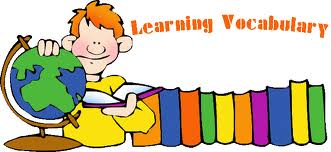There are a few stages to build up vocabularies. One of them is considering goals and objectives. The consideration of them in the same as the consideration of goals and objectives in the study of the other subjects. Before starting building up the vocabularies, learners should purpose what kind of goals ans objectives they are going to achieve. Proposing them will make the learners concentrate and focus on the memorization and retention of the novel words to be recalled sometime. In addition, they are able to control and evaluate their speed of progress. However, thinking over the goals and objectives is easy to suggest but sometimes has not been done yet by the learners. Absolutely, this consideration is not only useful for building up the vocabularies in particular but in all activities.
considering goals and objectives is less considered by learners. This stage is often forgotten although this is very crucial. Graves (1996:16) says goals are general statements of the overall, long-term purposes of the course. Objectives show the specific ways in which the goals will be achieved. The goals of a study represent the destination; the objectives are the various points that stage the study toward the destination, students should pass each of the points. The destination of building up vocabulary is the students are able to master and use the vocabulary in the written and spoken contexts. Quoting Gattegno, Richards (1992: 101) says that the objectives are: a) the students are able to master the semi-luxury vocabularies consisting of expressions common in the daily life of the target language culture referring to food, clothing, travel, family life, and the like, b) the students are able to master luxury vocabularies that are used to communicate more specialized ideas, such as political or philosophical opinions, c) students are able to master functional vocabularies of the language, many of which may not have direct equivalents in the learners’ native tongue. When each of these points is achieved the goals of building up vocabularies are also achieved.
Nunan (1989:48) states goals are indistinct general inventions behind any given learning task. They provide a point of contact between the task and the broader curriculum. Goals may relate to a range of general outcomes (communicative, affective, or cognitive) or may directly depict teacher or learner behaviour, another point worth identifying is that foals are not always explicitly mentioned, although they can usually be inferred from an examination of a task. Besides, there is a rarely a simple one-to-one relationship of goals and tasks. In several cases a complex task that involves a range of activities might be simultaneously moving students towards several goals.
The consideration of goals and objectives is necessary because students often study without specific purposes. Hamalik (1990) affirms one of the common mistakes made by students is studying without understanding the goals and objectives that are going to be achieved. Without certain goals and objectives, students could not realize the destination of the study. Consequently, they do not understand the topics that should be learnt, the strategies used to study the materials, the learning aids that should be prepared. and the way to evaluate the achievement.
Gerlach (1980) states one of the distinguishing characteristics of a learning objectives is that it reduces ambiguity to a minimum. Such objectives are not subject to many different interpretations. Some writers refer to objectives of this type as behavioral or performance objectives or criterion-referenced objectives. Others use the terms operationally stated objectives (that is, the objectives is stated in terms of the operations or procedures employed by the learner). It makes little difference what name you use. It is important that the behavior of the product in which you are interested be well defined. Since this is the type of objective which we find useful in teaching, we will simply use the term “good” or “useful” to refer to such well defined objectives. A good objective exhibits four distinguishing characteristics: a) it describes something which the learner does or produces, b) it states a behavior or a product of the learner’s behavior, c) it stated the conditions under which the behavior is to occur, and d) it states the standard which defines whether or not the objective has been attained.
That is clearly apparent that thinking over goals and objectives in building up vocabularies in particular and in learning the other subjects in general is one of beneficial stages in learning processes. The learning activities will, therefore, yield good or bad result depending upon whether or not learners comprehend their goals and objectives. Their learning can be time consuming or productive. It can be wasteful if they learn without the goals and the objectives. But it cannot be impossible to be advantageous if they start by goals and objectives from the very beginning.
Another must also be obvious that to think over goals and objectives is not only teachers’ business. It must also be learners’ attention. Unless they will have no destination because the learners will confuse to prioritize their learning target. Up to the present time, however, most of students go to schools or campuses without clear destination. They come in class with an empty bag of mind; no preparation, no goals and objectives, and finally no clear result. And unfortunately, they know nothing at the end of studying. For the reason, thinking over goals and objectives should be the main priorities in learning processes. (F)
by: Mr. Ruwandi, MA

